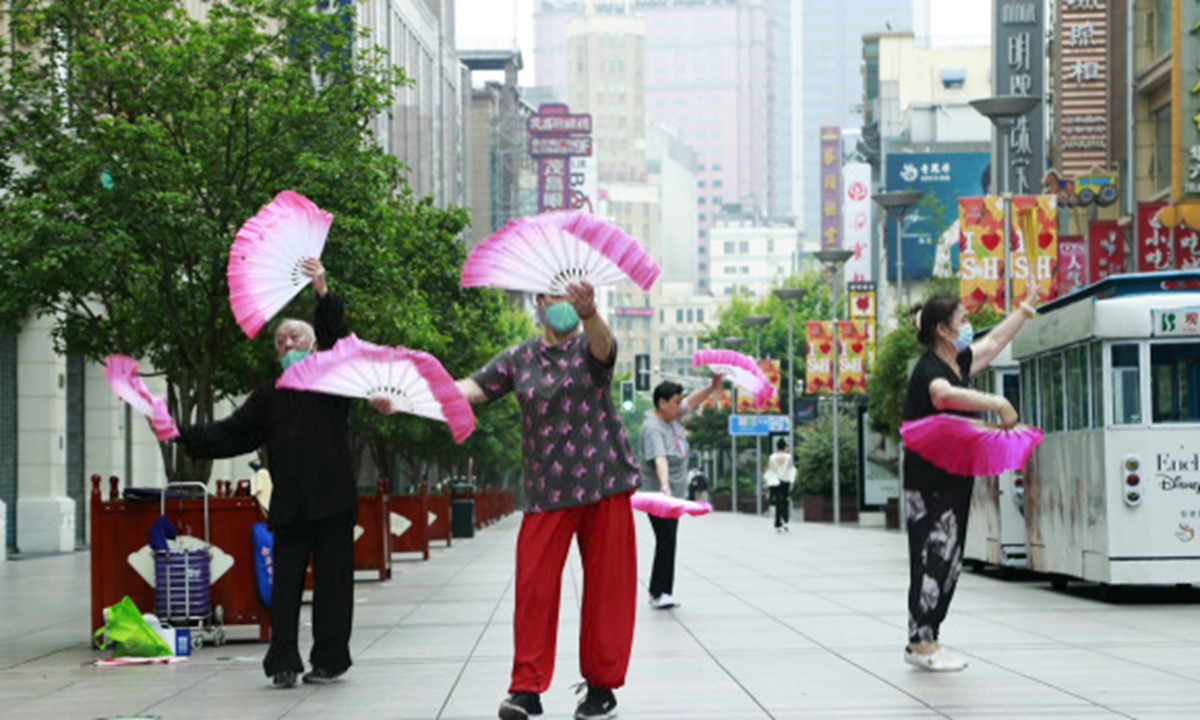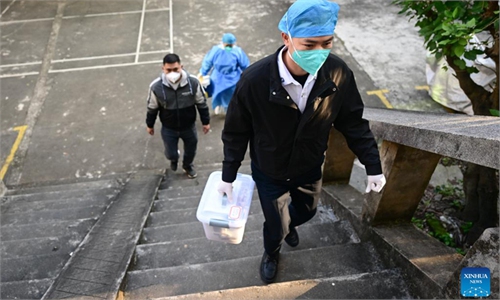ARTS / CULTURE & LEISURE
How and when to exercise after COVID-19
Taking small steps

Locals exercise on the Nanjing Road Pedestrian in Shanghai. Photo: IC
It has been over two weeks since Beijing local Jessie Liu recovered from COVID-19, but he is still struggling to get back his stamina.The 30-year-old IT engineer tested positive in early December and had high fever, cough and body aches for several days before finally testing negative. Feeling much better, Liu, who used to exercise two to three times a week, is now eager to start working out again and wonders when he can return to the gym.
Millions of people in China who have recovered from COVID-19 have the same question as Liu: "When can I do some exercises like running and swimming, or competitive sports like football, basketball and badminton?"
Many Chinese experts say that it will take a while for most people to return to their previous physical condition and so it is important to give one's body time to rest and recover.
"During the infection period, the virus will attack all the organs of our body. These organs will need time to recover, so some people will feel very tired," explained Zhang Lei from the Shanghai Jiao Tong University School of Medicine.
"Exercising too early at this time may aggravate the lungs, heart and other organs, resulting in myocardial fibrosis and even viral myocarditis."
Myocarditis is an inflammation of the heart muscle, which can be caused by the COVID-19 virus eroding the body, so doing exercise is not the direct cause behind the disease, Zhang Yimin, sports and health professor from Beijing Sport University, told the Global Times.
However, if the heart disease caused by the virus is ignored by patients who actively engage in sports during their recovery period, it may induce myocarditis or even trigger more serious diseases, he noted.
"So it is better to not immediately engage in high-intensity exercise right after symptoms disappear, even if you are used to high-intensity exercise for years," Zhang Yimin said.
According to a study from the US Cleveland Clinic, a non-profit academic medical center, patients should rest for at least 10 days from testing positive to allow the body to fully recover, which also means avoiding elevating one's heart rate.Zhang, the sports and health expert said that after test results come back negative and all symptoms disappear, one should resume "a relatively calm exercise routine, such as practicing yoga and outdoor jogging. It is recommended to keep each session under 10 minutes."
"It's better to wait two or three weeks before people gradually return to their normal exercise habits. But if there is a recurrence of symptoms after exercise, all exercise must be stopped," he noted.
Liu Qingquan, dean of Beijing Hospital of Traditional Chinese Medicine, noted that a balanced and nutritious diet is also important.
"After an illness, it's also recommended that you not stay up late."
In addition, experts noted that psychological issues brought about by the pandemic should not be overlooked.
Having experienced the stress and the swamp of depression caused by COVID-19, Li Mengnu, a psychologist has become a volunteer to help improve people's mental health.
"I started a WeChat group chat to help people around me who catch COVID-19. Mostly we deal with some very personal issues that people do not want to share with people close to them," Li told the Global Times.
The volunteer therapist said that most of the issues she has encountered mainly surround on how COVID-19 sabotages people's relationships with their close ones and the sense of helpless people feel when dealing with social issues.
"I think people's major danger isn't really their negative emotions, but that they do not realize these situations are temporary and can be avoided with rational and scientific methods," Li said.
Li said that trusting science, keeping a journal to express negative feelings and finding listeners like her are effective ways to promote good mental health in the face of COVID-19.
"First, talking or writing about your negative feelings helps you to face your issues. Also, 'good distractions,' for example, music, cooking and even meditation, are also good ways to find mental peace during COVID-19," Wang Ming, a mental health expert, told the Global Times.



